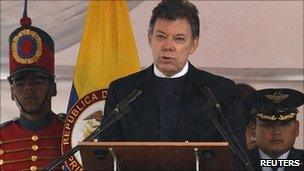Colombia's Santos outlines new tactics against rebels
- Published

President Santos is currently enjoying high approval ratings
Colombian President Juan Manuel Santos has set out new strategies against guerrillas who are increasingly resorting to hit-and-run raids.
Mr Santos, speaking on his first anniversary in office, said there had been great progress.
But he said the fight against armed groups, including rebels and criminal gangs, needed to be revised.
This includes improved intelligence-sharing and smaller, more flexible units to take on the rebels.
"I've ordered the defence ministry to revise the way the (army) controls territory, including our borders, to use our forces more efficiently and effectively," President Santos said.
Mr Santos said the rebels were reacting to increased pressure from the security forces in a bid to survive.
They were increasingly dressing as civilians to merge into the general population and carrying out small-scale attacks for maximum attention but little risk to themselves.
"We have to adjust our doctrine, our operations and our procedures to the way (the rebels) are operating," he said.
Mr Santos took over from Alvaro Uribe, who pursued a hardline policy against the guerrillas that led to the killing of commanders and high-profile arrests as well as desertions from rebel ranks.
Violence has declined overall in Colombia but guerrillas, especially fighters from the Revolutionary Armed Forces of Colombia (Farc), have continued to carry out attacks.
There has also been a rise in organised crime gangs that, like guerrilla groups, are heavily involved in drug-trafficking.
The authorities refer to these gangs as Bacrims (organised criminal bands) and regard them as a major security threat.
President Santos, who took office on 7 August 2010, is currently enjoying high approval ratings, put at 85% according to a recent poll.
His first year has seen previously strained ties with neighbours Venezuela and Ecuador improve.
- Published19 July 2011
- Published18 June 2011
- Published25 April 2011
- Published29 August 2013